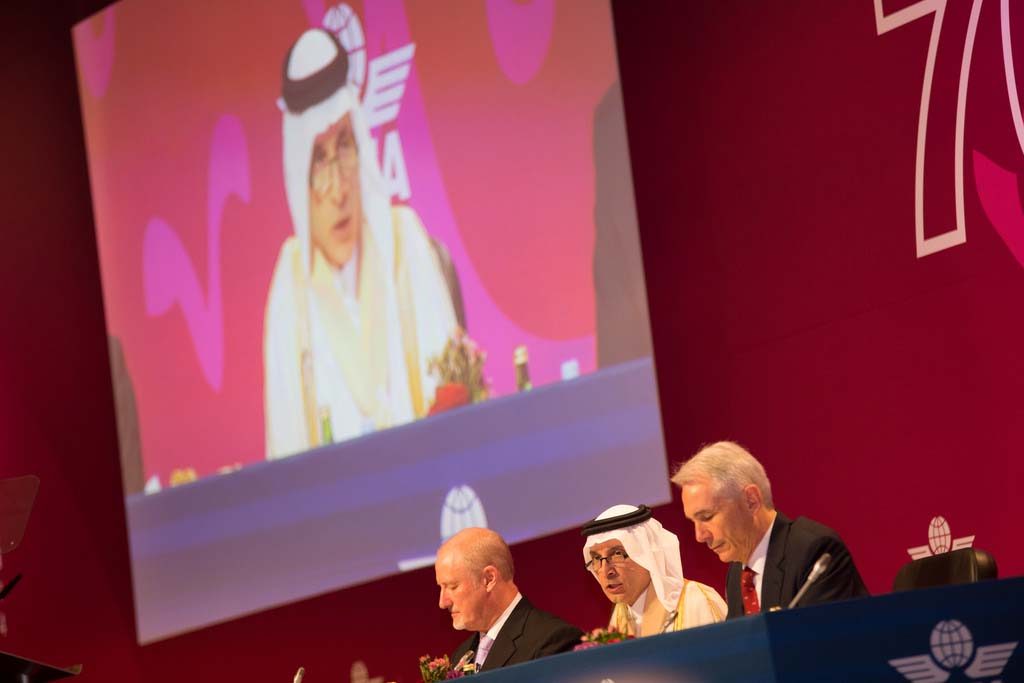
Qatar’s new Hamad International Airport may have been heavily scrutinized when it became fully operational last Tuesday, but it wasn’t until this week that some of the world’s most discerning air travelers passed through its gate.
On Monday, more than 1,000 airline executives alongside dozens of business and aviation journalists descended on Doha for the annual gathering of the International Air Transport Association (IATA) at the Ritz-Carlton Doha hotel.
This is the first time the organization has met in the Gulf for the three-day event – which has put Qatar’s rapidly growing aviation industry and the recently opened airport in the global spotlight.
IATA’s chief executive, Tony Tyler, had already paid tribute to the new airport in a pre-meeting press conference, calling it a “very impressive facility” that would turn Qatar into a “truly competitive global hub.”
Even Emirates president Tim Clark praised HIA in an interview with Al Jazeera:
“I didn’t expect any less … It’s probably striking terror into the community of airlines that regard the Gulf carriers as an issue. It’s a great airport.”
Eyes on Al Baker
At the center of the action was Qatar Airways CEO Akbar Al Baker, who as host chaired the annual general meeting.
Sporting an arm sling following a car accident late last week, Al Baker’s focus was on greeting his guests alongside his official duties moderating the conference’s meetings. He did, however, repeat his call for India to loosen restrictions on foreign carriers such as Qatar Airways serving that market in a media briefing:
@qatarairways ceo akbar al baker blasts Indian private airport operators for exorbitant and unreasobable airport charges.#iataagm
— k.srinivasan (@cruisingheights) June 2, 2014
Speaking to reporters as he headed back to the main ballroom, Al Baker said:
“Nobody should protect their national carrier. They should protect the interests of the country and the interests of the citizens of their country. And the interests of the citizen is to open up air services for more airlines.”
Al Baker’s remarks about prioritizing the needs of local residents comes amid discontent among some Qataris regarding their own national airline.
In 2012, a local campaign was launched among Qataris to boycott this country’s national carrier. At the time, organizers cited as grievances the targeting of nationals by charging higher ticket prices in a monopolized market; indiscretion in serving alcohol in‐flight; and underemployment of Qatari pilots and employees regardless of their qualifications.
Al Baker also made the impression on at least some guests with the opening night festivities, which included a concert and fireworks:
Say what you will abt #Qatar's Akbar Al Baker he throws a fine party. #IATAAGM 1st night-fireworks & Kelly Rowland. pic.twitter.com/eDVIpJaYIG
— Christine Negroni (@cnegroni) June 1, 2014
World Cup shadow
While IATA delegates were in town mainly to focus on aviation, many foreign journalists ended up reporting on new bribery allegations surrounding Qatar’s bid for the 2022 World Cup, which were reported yesterday by the Sunday Times.
The story continued to make headlines Monday on televisions set up for the conference:
You know what annoys me? @cnn sponsors #iata in Qatar then broadcasts potential 2022 corruption reports on screens at the event
— Khalifa Al Haroon – Mr. Q (@iloveqatar) June 2, 2014
Other broadcast reporters could also be heard discussing the corruption allegations during live reports, alongside other issues such as the country’s “oppressive” summer heat.
Similarly, Bloomberg TV devoted a portion of a segment on the conference to discuss the potential fallout for Qatar Airways if FIFA took away the World Cup.
However, the impact of that hypothetical scenario is minimal because Qatar Airways – like Emirates and Etihad – relies more on transiting passengers than those traveling to or from Doha.
Down to business
This year’s AGM was also a celebration of the 100th anniversary of the first scheduled commercial flight, a 23-minute journey across Tampa Bay, Florida, on Jan. 1, 1914.
The big headline of the day was a projection that airlines around the world are projected to book annual profits of US$18 billion this year. IATA officials insisted that while the figure may sound impressive, it would still work out to a profit margin of 2.4 percent, or less than $6 a passenger.
Beyond the industry’s economic performance, delegates also discussed how to improve aircraft monitoring in the wake of the still-missing Malaysian Airlines flight MH370, which disappeared nearly three months ago:
“A large commercial airliner going missing without a trace for so long in unprecedented in modern aviation. And it must not happen again,” Tyler said, adding draft recommendations on improving global tracking capabilities will be presented to the International Civil Aviation Organization in September.
Delegates also endorsed a resolution calling for governments and airlines to adopt new measures to deal with unruly passengers.
Finally, many Emirates passengers breathed a sigh of relief after Clark, the airline’s president, ruled out squeezing an extra seat into each economy row of the carrier’s A380s. Emirates executives had previously mulled the 11-abreast concept as a way of increasing the plane’s capacity by 35 to 40 passengers.
Tuesday’s agenda includes panel discussions on aircraft noise, the availability of skilled labor in the aviation industry, the sector’s reputation and government treatment of commercial aviation.
Thoughts?







